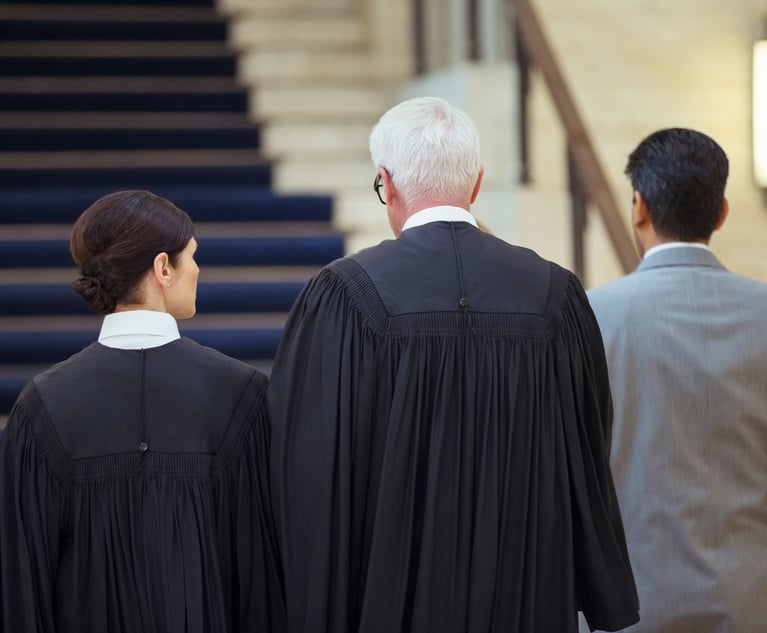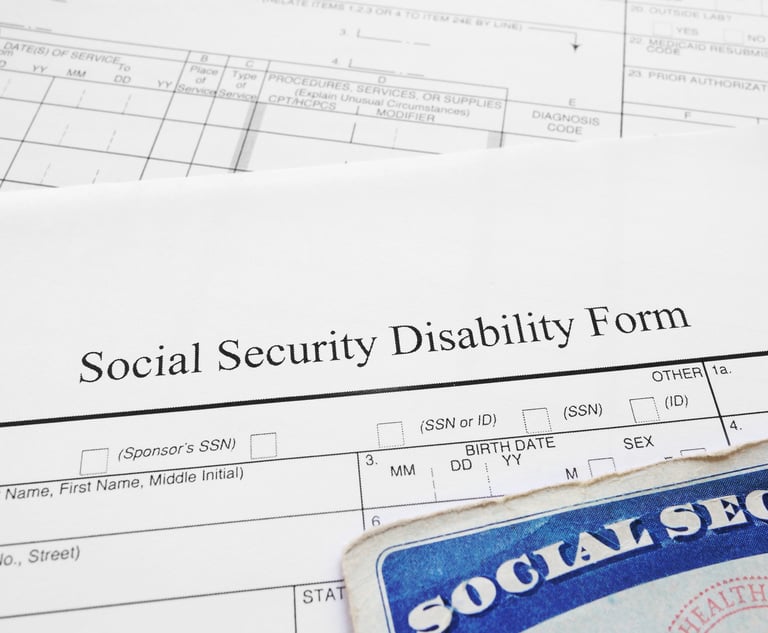Judicial Ethics Opinion 19-170
A judge may continue to preside in matters involving the APD, provided the judge concludes he/she can be fair and impartial, and disclosure is not required.
July 21, 2020 at 09:57 AM
4 minute read
The Advisory Committee on Judicial Ethics responds to written inquiries from New York state's approximately 3,600 judges and justices, as well as hundreds of judicial hearing officers, support magistrates, court attorney-referees, and judicial candidates (both judges and non-judges seeking election to judicial office). The committee interprets the Rules Governing Judicial Conduct (22 NYCRR Part 100) and, to the extent applicable, the Code of Judicial Conduct. The committee consists of 27 current and retired judges, and is co-chaired by former associate justice George D. Marlow of the Appellate Division and the Honorable Margaret Walsh, a justice of the Supreme Court.
Digest: On these facts, a judge's impartiality cannot reasonably be questioned in matters involving an assistant public defender, merely because the judge, in his/her capacity as a college or university administrator, has some supervisory authority over the APD's spouse on a multi-year grant-funded research project. The judge may thus continue to preside in matters involving the APD, provided the judge concludes he/she can be fair and impartial, and disclosure is not required.
Rules: Judiciary Law § 14; 22 NYCRR 100.2; 100.2(A); 100.2(B); 100.3(E)(1); Opinions 19-128; 15-151; 13-49; 90-120; People v. Moreno, 70 NY2d 403 (1987).
Opinion: The inquiring part-time judge is also a high-level administrator at a private not-for-profit college or university, where he/she heads the institutional planning department and serves as associate vice president of research and technology transfer. The institution recently hired the assistant public defender's spouse to manage a multi-year grant-funded research project. [1] The underlying grant application lists the judge as "key personnel" who will "provide institutional data and various project activities and tasks as needed." In addition, the judge will also "review expenses submitted against sponsored projects," and will approve or disapprove expenses on the project. However, the APD's spouse will not report directly to the judge, but to another faculty member who will help manage the project's daily activities. On these facts, the judge asks if he/she may preside in matters where the APD appears.
A judge must always avoid even the appearance of impropriety (see 22 NYCRR 100.2) and must always act to promote public confidence in the judiciary's integrity and impartiality (see 22 NYCRR 100.2[A]). A judge must not allow family, social, political or other relationships to influence the judge's judicial conduct or judgment (see 22 NYCRR 100.2[B]). A judge must also disqualify him/herself in any proceeding where the judge's impartiality might reasonably be questioned (see NYCRR 100.3[E][1]) or in other specific circumstances as required by rule or by law (see generally id.; Judiciary Law § 14). Where disqualification is not mandatory, a trial judge is the sole arbiter of recusal (see People v. Moreno, 70 NY2d 403 [1987]). If the judge doubts his/her own ability to be fair and impartial in a particular matter, then he/she must not preside.
While we have not previously addressed this specific scenario, some prior opinions may provide rough analogies. For example, although a part-time judge may not preside in matters in which his/her law firm colleagues appear, he/she may nonetheless preside in matters involving "an assistant district attorney who is the future spouse of the judge's law firm colleague" (Opinion 13-49). We also said a village justice may continue as a client of a salesperson whose spouse is the village prosecutor and, unless the relationship is substantially more than an ordinary salesperson-customer relationship, "may preside over cases where the salesperson's spouse appears as village prosecutor without disclosure or disqualification, provided the judge can remain fair and impartial" (Opinion 15-151). Likewise, although a village justice may not consent to appointment of a village trustee as the village court clerk, he/she "may consent to hiring a part-time court clerk whose spouse is a village trustee" (Opinion 19-128).
Here, we note the APD's spouse will work closely with another designated faculty member, rather than the judge, on a day-to-day basis. We believe this judge's impartiality cannot "reasonably be questioned" in matters where the APD appears, merely because the judge, in his/her capacity as a college or university administrator, has some supervisory authority over the APD's spouse on a multi-year grant-funded research project (see 22 NYCRR 100.3[E][1]; cf. Opinion 90-120 [discussing a part-time judge's obligations when co-workers from his/her outside employment appear before him/her]). The judge may thus continue to preside in matters involving the APD, provided the judge concludes he/she can be fair and impartial, and disclosure is not required.
[1] The position is a temporary one, lasting only for the duration of the project.
This content has been archived. It is available through our partners, LexisNexis® and Bloomberg Law.
To view this content, please continue to their sites.
Not a Lexis Subscriber?
Subscribe Now
Not a Bloomberg Law Subscriber?
Subscribe Now
NOT FOR REPRINT
© 2024 ALM Global, LLC, All Rights Reserved. Request academic re-use from www.copyright.com. All other uses, submit a request to [email protected]. For more information visit Asset & Logo Licensing.
You Might Like
View AllTrending Stories
- 1Call for Nominations: Elite Trial Lawyers 2025
- 2Senate Judiciary Dems Release Report on Supreme Court Ethics
- 3Senate Confirms Last 2 of Biden's California Judicial Nominees
- 4Morrison & Foerster Doles Out Year-End and Special Bonuses, Raises Base Compensation for Associates
- 5Tom Girardi to Surrender to Federal Authorities on Jan. 7
Who Got The Work
Michael G. Bongiorno, Andrew Scott Dulberg and Elizabeth E. Driscoll from Wilmer Cutler Pickering Hale and Dorr have stepped in to represent Symbotic Inc., an A.I.-enabled technology platform that focuses on increasing supply chain efficiency, and other defendants in a pending shareholder derivative lawsuit. The case, filed Oct. 2 in Massachusetts District Court by the Brown Law Firm on behalf of Stephen Austen, accuses certain officers and directors of misleading investors in regard to Symbotic's potential for margin growth by failing to disclose that the company was not equipped to timely deploy its systems or manage expenses through project delays. The case, assigned to U.S. District Judge Nathaniel M. Gorton, is 1:24-cv-12522, Austen v. Cohen et al.
Who Got The Work
Edmund Polubinski and Marie Killmond of Davis Polk & Wardwell have entered appearances for data platform software development company MongoDB and other defendants in a pending shareholder derivative lawsuit. The action, filed Oct. 7 in New York Southern District Court by the Brown Law Firm, accuses the company's directors and/or officers of falsely expressing confidence in the company’s restructuring of its sales incentive plan and downplaying the severity of decreases in its upfront commitments. The case is 1:24-cv-07594, Roy v. Ittycheria et al.
Who Got The Work
Amy O. Bruchs and Kurt F. Ellison of Michael Best & Friedrich have entered appearances for Epic Systems Corp. in a pending employment discrimination lawsuit. The suit was filed Sept. 7 in Wisconsin Western District Court by Levine Eisberner LLC and Siri & Glimstad on behalf of a project manager who claims that he was wrongfully terminated after applying for a religious exemption to the defendant's COVID-19 vaccine mandate. The case, assigned to U.S. Magistrate Judge Anita Marie Boor, is 3:24-cv-00630, Secker, Nathan v. Epic Systems Corporation.
Who Got The Work
David X. Sullivan, Thomas J. Finn and Gregory A. Hall from McCarter & English have entered appearances for Sunrun Installation Services in a pending civil rights lawsuit. The complaint was filed Sept. 4 in Connecticut District Court by attorney Robert M. Berke on behalf of former employee George Edward Steins, who was arrested and charged with employing an unregistered home improvement salesperson. The complaint alleges that had Sunrun informed the Connecticut Department of Consumer Protection that the plaintiff's employment had ended in 2017 and that he no longer held Sunrun's home improvement contractor license, he would not have been hit with charges, which were dismissed in May 2024. The case, assigned to U.S. District Judge Jeffrey A. Meyer, is 3:24-cv-01423, Steins v. Sunrun, Inc. et al.
Who Got The Work
Greenberg Traurig shareholder Joshua L. Raskin has entered an appearance for boohoo.com UK Ltd. in a pending patent infringement lawsuit. The suit, filed Sept. 3 in Texas Eastern District Court by Rozier Hardt McDonough on behalf of Alto Dynamics, asserts five patents related to an online shopping platform. The case, assigned to U.S. District Judge Rodney Gilstrap, is 2:24-cv-00719, Alto Dynamics, LLC v. boohoo.com UK Limited.
Featured Firms
Law Offices of Gary Martin Hays & Associates, P.C.
(470) 294-1674
Law Offices of Mark E. Salomone
(857) 444-6468
Smith & Hassler
(713) 739-1250










